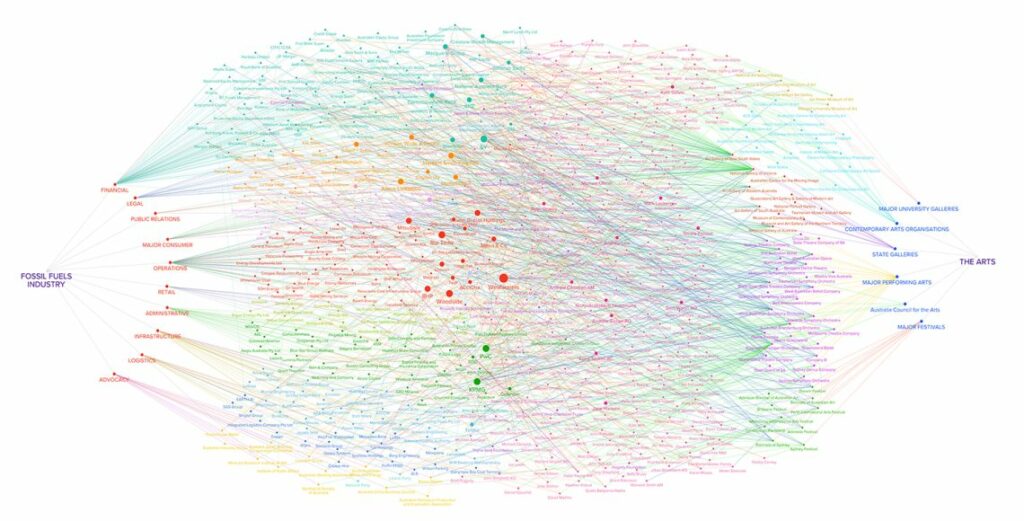Australian writer Tim Winton called on the gate-keepers of arts funding Australia-wide to not accept support from the fossil fuel industry. Winton’s comments in his closing address at the Perth Festival Writers Weekend came in the aftermath of fires in Western Australia, catastrophic floods nationwide (which are affecting not only Australians but our cultural archives) and are also in the wake of London’s National Portrait Gallery ending their 30-year partnership with oil company BP.
Winton said; “All around us every day financial institutions, super funds, shareholder groups and banks are withdrawing their patronage of the fossil fuel industry, because it’s seen increasingly as a bad bet with looming stranded assets and in their view, it no longer passes the ethics test. So how is it that we in the arts community should show less creativity and moral imagination than bankers?”
Winton’s passionate criticism has got people talking, and while the issue certainly hasn’t been resolved to his satisfaction there is evidence that action and attitudes have been changing overtime.
Produced several years ago, Will Foster and Gabrielle de Vietri’s multi-media work pointed to the relationships between the fossil fuel industry and the arts in a project titled Maps of Gratitude. In the film component they draw the connections between these companies and art institutions. At one point the narrator darkly states, ‘the museum is the perfectly civilised backdrop to negotiate the deals that will end civilisation’ and among many observations they compare the potential of shedding fossil fuel industry support with how sporting events succeeded in dropping tobacco companies as sponsors.

A similar sentiment was echoed in Winton’s recent address when he seemed perplexed that the Perth Festival musical production ‘Become Ocean’ which is about climate change was sponsored by Woodside, an Australian petroleum exploration and production company.
Winton said; “For who else in the corporate world, sailing so close to reputation oblivion, could feel that safe and so confident? You reckon a brewery would put itself forward for a show about fetal alcohol syndrome? How about the tobacco industry sponsoring ventilators for lung patients?”
A tide is turning. As Gina Fairley from Artshub reported recently, some institutions and events are following a path away from the fossil fuel industry; the Biennale of Sydney is fossil fuel free, the Adelaide Fringe Festival had a big green energy sponsor in Lumo Energy and events such as the Adelaide Biennial and 4th Indigenous Triennial, presented by the National Gallery of Australia are also not reliant on fossil fuel sponsorship.
What can the individual artist do?
Some initiatives you could look into include: 350 org, a global network that acts locally to, among other things, ‘cut off the social license and financing for fossil fuel companies — divest, desponsor and defund.’ You can join their artist collective here. Australian group FEAT is a new program that aims to reduce the emissions of live entertainment by unlocking sustainability funding through ticket sales.
Climate change clause in artist contract
Moreover, partnered with 350, and Go Fossil Free, a US collective called Groundwater Arts shared guidelines for artists, in 2021 that can be appropriated today, to include a refusal of fossil fuel arts sponsorship in their contracts.
Alex Kelly reprised this idea in an article for Overland ‘The Arts in Australia need to break up with Fossil Fuels’ where they note that ‘Artists can advocate for the inclusion of similar clauses in Australia’s workplace agreements developed by our peak arts organisations such as NAVA, Theatre Network Australia, APAM and MEAA.’
Client/Employer [should define “Client” and “Employer” in the contract] hereby represents and warrants that: (i) it has not heretofore knowingly and willingly received funds or donation from fossil fuel industries, including, but not limited to, contributions in kind, cash, or by means of sponsorship; (ii) it will not knowingly and willingly accept funds or donations from fossil fuel industries for the duration of the term of Contractor’s [should define “Contractor”] contract; and (iii) will not pay Contractor’s fee from any funds or donations received from any fossil fuel industry. For the purposes of this agreement, “fossil fuel industries” are defined as producers of coal, petroleum, or natural gas, or any derivative of coal, petroleum, or natural gas that is used for fuel.
Groundwater also call for artists and companies to ‘divest to invest’ and act in our personal lives, from choosing an ethical superannuation fund or banking differently. Their third talking point is to encourage artists to collaborate with organisations that have these goals. They say ‘An equitable, thriving future for the arts sector is predicated on arts workers taking responsibility for the larger unjust systems we are a part of.’